|

Yesteryear
create high-quality audio-visual nostalgia products that
celebrate Britain's glorious past. Here,
Digger talks to John Boyden at Yesteryear who formed the
enterprise with Andrew Humphries. They talk about how the business was created,
about Yesteryear's products and their plans for the future.
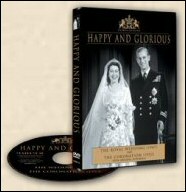
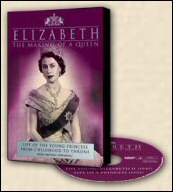
The
Royal Collection
Digger:
Hello John. I didnít know which number to call you on Ė
the wonders of modern technology!
John:
Itís not that, itís the wonders of staircases! (Both
laugh)
Digger:
You must be careful. Were you coming up or coming down?
John:
I was coming down.
Digger:
A few months ago I was coming down the winding narrow stairs
of this old Northampton stone house with coffee cup in one
hand and washing in the other and missed a corner step and
bumped my way down the stairs on my backside. I just sat at
the bottom of the stairs for ten minutes feeling sorry for
myself surrounded by washing and coffee and it took a number
of weeks for my knee to heal and the aches to go.
John:
A nightmare. We have got Yorkstone at the front of our house
and twice I went out without thinking when it was raining and
I went bottom up and smack on my back. The first time it
knocked the wotsit out of me and I felt awful and just lay
there in the rain. The second time I did it I was holding my
two and a half year old grandchild.
Digger:
God.
John:
I can remember clearly, although itís only a split second as
we know, consciously pushing my right arm up in the air and
she didnít hit the ground. Itís incredible.
Digger:
There's this instinctive protection going on. Amazing isnít
it?
John:
Yes, it switched in and I seemed to have time to do it.
Digger:
Youíve got a guardian angel there, havenít you?
John:
I think she has. But she shrieked with sheer shock at being
six feet up in the air and then bang.
Digger:
Some kids would find it quite exciting and not realise the
danger.
John:
Where are you in Northamptonshire?
Digger:
Duston.
John:
I spent the war years in Stoke Goldington.
Digger:
You know the area better than me. Iím just a relatively recent
blow-in. Please tell us about the background to Yesteryear
and how and why you and Andrew formed this enterprise.
John:
Andrew was the head of the music division of Readerís Digest
and I got to know him quite well because his predecessor was
somebody I had known for years. I spent my life producing
records.
Digger:
Can you tell us what sort of records?
John:
I produced about 2,000. Where do you want me to start?
Digger:
(Laughs) Give us some names that weíll be impressed by.
John:
I recorded Douglas Bader. Thatís a record we still sell, of
airplane noises. I did that for the 50th
Anniversary of the RAF in 1968. I rang him up Ė he was the
head of Shell Air Company and he was in the Shell Building on
the south bank. So I went down and saw him.
Digger:
Was he petulant? They say he could be stroppy.
John:
Not a bit, no. I met him I suppose half a dozen times, maybe
more, and we got on. Maybe he and I were kindred spirits in
the petulance brigade.
Digger:
(Laughs) No, but you often hear these stories ďSo and so is
a right wotsitĒ and then somebody else says ďNo, not at
all, they were great.Ē
John:
Iíve got to say he was extremely helpful to me in other areas.
I wonít bore you with what that was but he was an absolute
gentleman. He used to walk me down the corridor to the lift
and get the lift open for me and all that stuff. He didnít
really need to do that.
Digger:
Thatís good.
John:
I thought he was a smashing bloke. I mean, he wasnít an
intellectual for Godís sake, he was a blood and guts old-fashioned Bulldog Drummond type. In modern terms heíd be
called a
racist. But we didnít have racists then. I recorded A.J.P.
Taylor and then on the classical front I recorded virtually
every orchestra and over 100 different conductors. Many times
in some cases. I gave all sorts of people their first chances.
Iím not a company man, Iím a buccaneer, so I worked for
EMI for a while and then started a label called Classics For
Pleasure which is the biggest selling classical label
thereís ever been in this country. I started that in 1970 on
the back of sponsorship I got from WD & HO Wills.
Digger:
Another name from the past.
John:
Theyíre now part of Imperial Tobacco. And I made a deal with
them and the London Philharmonic Orchestra to make six records
a year for three years and the deal ran for 15 years Ė not
with me I hasten to add. And I gave people like Dame Margaret
Price as she is, Sir Andrew Davis, John Lill, The Gabrieli
Quartet, Howard Shelley Ė all these people their first
recording opportunity. I formed all sorts of things and we
sold bucketloads of records and that was the name of the
business. So I worked with them all.
Digger:
Because Music For Pleasure used to get al the hits that there
had been in the last few weeks and record new versions of
themÖ
John:
MFP was the parent of CFP and I was taken on by MFP in 1967
and I started CFP three years later. It seemed an eternity at
the time, but when I think about it three years wasnít really
a long time to wait. Anyway, I gave that up and went to become
the first Managing Director of The London
Symphony Orchestra, which wasn't a great success because
I sacked Mr Previn which I thought was a thoroughly good idea!
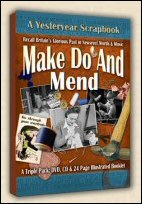
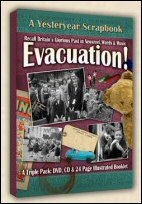
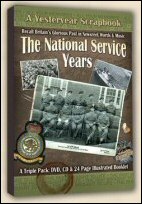
Yesteryear
Scrap Books
Digger:
Mr Preview as Eric Morecambe used to call him.
John:
Well, absolutely. This is huge subject and I donít want to
get you into it because it will take two books! But then I
went back into the record business and started a thing called
Enigma, where I recorded Angela Rippon when her legs were
famous Ė you talked about Morecambe and Wise. And I got her
to do Peter and the Wolf and we had a big success with that.
Then the people who owned the business sold it under my feet
to Warner Bros. So I was with Warner Bros. I was with them
about 18 months and then they had a really bad spin and they
closed everything down that they werenít really interested
in, including us. So I was out on the street again. So I
started up several businesses, some of which still work and I
was given a consultancy by Pickwick group. This was the first
non-full price CD label two years before EMI even started one. We
did terribly well and gave a lot of new people chances. Andrew
asked me to produce some middle of the road discs for him for Reader's
Digest and I did that. We got talking idly and he said he
really wanted to run his own thing and I said ďWell, I need
to make a living and I havenít got anything particularly on
at the moment thatís exciting. We could form a company.Ē
So, in 2003, we formed the company. About a year later Ė in
2005 actually, we started trading and the company was called
Green Label Music Company, which is a daft name and nothing to
do with me I hasten to add. (Digger laughs)
Digger:
Did it have everything to do with Andrew?
John:
I think so Ė he liked it! But we couldnít trade with it. I
came up with the name Yesteryear and we started with one CD,
which weíre still selling, called Weíll Meet Again. Itís
got Dame Vera on it , of course. Andrew was still working
for Readerís Digest Ė this was six years ago. I, being an
ex-army bloke, because I did my National Service, rang up
military museums and wrote to them and I started there selling
it to their shops. Because the high street was hopeless even
then Ė it clearly had the blight of death on it as far as
recorded music was concerned. From that we developed into
approaching all sorts of heritage centres and we developed a
set of over 300 alternative outlets.
Digger:
There are some very impressive venues there on your list.
John:
Yes. I think that's the secret for our success Ė because weíre
undoubtedly a success as we didnít have any capital Ė
maybe £200 to invest each at the start and that went on the
first pressings. The first order I took was so big itís
never been repeated. I thought if we can do this, weíve hit
the money. I actually got an order from Blenheim Palace for
300 units Ė we didnít, but it happened at the right time
and it made us fluid.
Digger:
Another guardian angel.
John:
Exactly. That was fantastic, so in February of the following
year in 2005 Andrew quit Readerís Digest. But we still have
an association with them and weíve produced a lot of triple
disc box sets for Readerís Digest, which is a hangover from
the old relationship which lasts to this day. And which has
proved very good for us because we sold them product under our
brand. Of course they then sell it and we have it for the
rest of the world to do what we like with.
Digger:
The demographic is similar overseas, I suppose?
John:
We have to come up with all the ideas and the products and
itís all based on nostalgia. So we built up very quickly, in fact,
by not taking any money out of it. We ploughed all the income
in and achieved fluidity by growth which was pretty smart
stuff. Then, at the start of 2007, we bumped into a chap who
said something about newsreel. He said he could get hold of
newsreel. We didnít use this fellow, we didnít need to, but
it suddenly dawned on us that if we used newsreel then we
could attach it to discs of post-war music. Because the
copyright law - and we work entirely under copyright, is fifty
years on the mechanicals meant that every year there was
another yearís worth of stuff. But nothing happened after
the war, you know. I mean after the war itself and all the
incredible associations you could sell popular music in a very
clear way that had nothing to do with music. But suddenly,
post war what do you do? You canít make rationing exciting
or the Korean War or the Malayan Campaign or any of those
things.
Digger:
No, you have to wait for the birth of rock and roll and the
sixties.
John:
Yes, you have to wait for all that rock and roll and clearly
we werenít waiting for that. So I thought that if we added
newsreel, put it on the CD because you can have one called an
enhanced CD and itís playable on a computer or through your
TV. Youíve got all your tracks of music and then you finish
up with ten minutes of newsreel. Well, we were going to do
that and then Andrew said ďNo, youíve got it wrong." which
of course he often does because thatís what youíre in
business with someone else for. I said ďWhy?Ē and he said
ďNobodyís going to understand anything about an enhanced
CD with the market weíre selling to. Theyíre tending to be
older people. They won't understand it and youíre wasting
your timeĒ I thought he was right and so we dropped that
and I then went back to ITN who were licensing the newsreel
and did another deal for a further ten minutes of newsreel and
we then produced it calling it The Scrap Book. We dealt
with subjects of social history. The first three, there was
National Service, Transport Racing and Record Breaking and Pageantry
and The Crown, because I knew that The Queenís wedding was
coming up. So we 'bunged' The Queenís wedding on and we made a
mistake. We made it CD-sized, so the little pack held a CD, a
DVD and a booklet, but it didnít look like anything much in
the shop. It had no presence. So were selling it off the page
in terms of advertising brochures, mail order and all that
kind of stuff but not doing as well with it in stores as we
should have done. But then, thatís why we repackaged it all
and weíre repackaging the last title at the moment.
Digger:
Thatís important because of the nature of the technology now
what you're buying isnít very tangible so you have to bump
it up.
John:
You do. Itís the old perfume gag Ė a great big fancy box
and a little pot inside. Well, weíve got a bigger pot inside
but itís a bigger pack. And itís cost us a lot of money,
in fact, but there you go you learn by your mistakes. But the
impressive thing that happened was that we brought these out
at Easter in 2007 and in summer I got a phone call from Buckingham
Palace and they said ďCan you do a DVD of this stuff?Ē and
I said ďWell, weíve already got the Scrap Book.Ē And
they said ďNo, no, we donít like that. Itís got popular
music and we just want a DVD of the wedding.Ē There wasnít
enough material so we bumped it up with Coronation stuff but
that got us as a supplier to The Royal Collection which is the
commercial wing of The House Of Windsor. We did
terrifically well with that and we made a deal with The Daily
Telegraph, selling to their customers through that. We really
made hay. So the business leapt ahead considerably and at this
point we were each still working from our own houses Ė I
still do. But the company, of course, has now got premises out
in Romford in Essex near where Andrew lives. He runs the thing
there, weíve got staff, weíve got overheads and all the
paraphernalia and we do all our own distribution and donít
go outside for any of that. We do a fair bit of export but not
a huge amount. We have only just got a website that works
going because we didnít have the money.
Digger:
Are you exporting to ex-pats and so on?
John:
Yes, we supply Reader's Digest Australia Ė weíre just
making a deal at the moment with an actual distributor in Australia
and New Zealand. Iím very surprised there was even a market
for our stuff because itís very Anglo-centric.
Digger:
What about The Americans?
John:
The Americans are another thing. So the company moved on and
we formed associations with all sorts of people Ė The
Imperial War Museum, The Bader record for example and a
charitable deal with the RAF at Hendon so we pay them a little
bit more, and so on. The analogy I use is one Iíve used for
forty years, which is of the walking wounded in a battle.
Youíve got one good leg and another blokeís got another
good leg and between the two of you youíve got two good
legs.
Digger:
Yes.
John:
And thatís it. Youíve got to form associations with people
whose interests are not exactly the same as yours but broadly
in the right direction. To do it all yourself Ė to promote
and advertise and so on is so expensive. And although the
heritage market or the nostalgia market, or whatever you want
to call it is bigĖ I think itís more heritage than nostalgia
now. Weíre not dealing with music anymore and weíre now
dealing with a different sort of product and itís very
important in business that you know what business youíre in.
Because a lot of people think theyíre in one business when
in fact theyíre in something else and it colours everything
you do. I mean, for example, if Arthur Scargill knew anything about
marketing, apart from knowing anything about politics, he would
have realised that if heíd changed the name of The National
Union of Mineworkers to The National Union of Energy Workers
heíd still be in business.
Digger:
Yes, yes, yes.
John:
Thatís the point. You can go on all your life trying to sell
something which actually nobody wants anymore. But trying
something elseÖ
Digger:
Yes, sometimes with maybe just a few subtle changes.
John:
Yes, and change your attitude and thatís very, very
important so weíre consciously now trading, although still
as Yesteryear, we only changed the registered name Ė the
company name about two months ago.
Digger:
Whatís the difference between nostalgia and heritage?
John:
I think itís an interesting point. I think heritage is a
sort of classier thing. Itís more substantial. Itís to do
to some extent with bricks and mortar and ideas. Whereas
nostalgia is the sort of fleeting feeling when you suddenly
smell something and it takes you back to three years old. I
mean, I remember going on a bus into Northampton and there was
a big brewery called Phipps on the southern side. A big red
brick place and I think itís Carlsberg now. I always
remember the smell of the hops.
Digger:
That still wafts across if the wind is right even to us here.
John:
It was fantastic and if I get that smell Iím suddenly six
years old. I think thatís nostalgia. And another thing we
have to remember, well we donít have to remember anything
actually because weíve got computers havenít we?! But what
we ought to remember is that the real meaning of the word
nostalgia has nothing to do with remembering the past. The
original Greek is remembrance of place but weíve corrupted
it.
Digger:
As we do.
John:
Itís become a memory of time.
Digger:
What
are the most enjoyable aspects of what you do?
John:
The freedom.


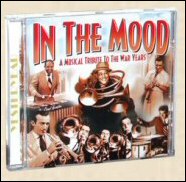
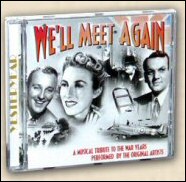

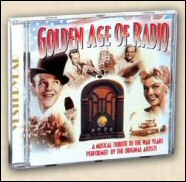
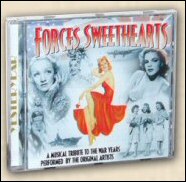
Victory
1945 CDs
Digger:
What sort of feedback do you get from customers and retailers?
John:
Weíve always, I must say, had a very good feedback. There
are several reasons, the first being originality Ė weíve
gone for putting in new ideas right from the beginning. The
second one, not necessarily inferior to that, is Mr
Humphriesí dedication to quality.
Digger:
You do all of the research and creative stuff?
John:
I donít do all of it by any means but I do a lot of it.
Digger:
I mean you don't outsource it?
John:
We occasionally outsource notes on popular music because I
donít really know a lot about that.
Digger:
Ask me! The sixties and the seventies are my speciality.
John:
Mr Humphries is very good at that. He did nothing but compilations
for Readerís Digest and he was brought up on it. Heís a
young chap Ė heís half my age. And so itís very good. I
donít know how he puts up with working with a geriatric like
me, but he does.
Digger:
He probably appreciates wisdom and experience and all those
sorts of things.
John:
You and I know that they are just memory and irrelevant.
I always look for the angle to try to look to see how we can
do something thatís going to leave the opposition in
difficulties.
Digger:
There is opposition, is there?
John:
There is opposition but we donít take any notice of them. I
never ever did, even when I was in the classical music business
pure and simple, which is the subject of fashion as much as
anything else. Marketing for me is dead simple and Yesteryear
is an example of that Ė it begins with the conception of the
product Ė itís not to do with selling something, itís to
do with marketing which is to get the right product to the
right place and the right price at the right time. That's the
end of it and youíve got to make something that fulfils a
need. If it doesnít do that youíre not going to sell it.
People have got to think ďI want to buy this. I want to know
what happened to rationing or in The Blitz and hereís a
thing with a book, a CD and a DVD of the period.Ē That is
the sort of package you can give Great Aunt Maude when
youíre out at Polesden Lacey and you think youíve got to
buy the old bat something.
Digger:
Or if somebody has a project to do?
John:
Yes we still have a number of people who ring us up and order
and theyíve done so since the early days. They buy them for their
grandchildren and they want them to know what it was like to
make do and mend. The make do and mend and National Service
ideas Ė thereís very little of them these days and there's
hardly any literature available on National Service.
Digger:
Thatís strange because it was such an important and huge
part of life for decades.
John:
It officially started before the outbreak of the Second World
War but it was revived after the war because they realised
that The Empire needed far too many people to look after it,
protect it and especially as it was going to be run down and
they couldnít do it with just recruits. People had to be
dragooned in and that was what it was all about and we were
very cheap, of course.
Digger:
What are your plans for Yesteryear?
John:
Well, weíre now developing a new series, the first one
of which has just come out Ė itís a very exciting thing
and weíve made four on Westminster Abbey and itís very much like a Scrap Book but itís not a Scrap
Book . It has a much bigger booklet, much fancier and in
colour. And we have a DVD with twenty minutes of Pathe newsreel
of the Abbey, including the bringing of The Unknown Warrior in
1920. Weíve got Churchill making an appeal, The Blitz,
weíve got holes in the roof and holes in Big Ben and in the
old Houses Of Parliament, which were bombed. Thereís all that
stuff. Weíve got the American Army going in for Thanksgiving
in 1943. Weíve got The Queen for the 900th
Anniversary of the Abbey and then we branched out completely.
We actually made a video of the inside of the Abbey which
lasts 25 minutes, with a commentary by the Dean of
Westminster. The audio disc is a completely remastered and
revamped and terrific sounding selection of the music from the
coronation, plus some music by Purcell who was the organist
there.
Digger:
This has been digitally remastered?
John:
Yes, it was the BBC who recorded it on tapes from EMI and, of
course, it was compressed in order to get it through the
medium wave. There was no FM even then, so we digitised it and
expanded all the climaxes so it actually does sound thrilling.
You can actually hear the resonance of the building, which is
beautiful.
Digger:
I have heard the music from that and itís very evocative.
John:
You know the choir was 400 boys and men? 400, itís such a collossal
sound and that is going out like flies. Itís so successful
and itís only been out for six weeks. At the moment itís
only being sold by the Abbey.
Digger:
Are you moving forward through the fifties and into the
sixties?
John:
This series weíre going to do for other heritage centres in
the same format so thatís a whole new line and it will be
available to all trade customers, of course. But, initially, the
Abbey has got a six months exclusive on it. We will repeat
that formula because itís clearly so successful. Thatís
very exciting. Now, as far as popular music is concerned, yes,
of course, weíve just issued a new series called We Remember
Them Ė Iíve not had anything to do with it but theyíre
single artist recordings Ė Vera Lynn has started it off and
thatís really flown off the shelves. Then weíve got Glenn
Miler and all the usual villains and thatís got tremendous
packaging as well Ė we donít stint on them. We put great
sleeve notes in.
Digger:
Yes, they look fantastic.
John:
They also fulfil what is the necessity as far as Iím concerned
of having human faces on them. One of our competitor companies,
who I shanít mention, go for a very stylised design which is really
fine and very well done but thereís something inhuman about
it. The bloke we deal with at ITN says weíre the only ones
who have successfully found a method of selling newsreel. Because
other people do it by date, because it was your year or something.
But all of those events donít mean anything because they
were all random.
Digger:
I think also people arenít very good at remembering when
something happened either.
John:
No, but if you take a subject like we have and you put all the
items on the newsreel, all belong to that subject. Then you
canít watch more than 20 minutes of it. Youíd go mad. But
20 minutes of it and youíve got a very good idea of what it was
like on that particular subject and thatís really why
weíre scoring. Itís the honing it down to the essence of
the subject and dealing with it comprehensively.
Digger:
What youíre also doing is tapping into the modern thing
where people donít have much of an attention span.
John:
Thatís sad and a sign of the times. I got an email from a PR company the other day
and it was full of errors. Why would I use their services?
Digger:
Yes, I saw one of my friends was using an 'author' for content
for his site and the authorís site was full of spelling
errors and typos! People donít seem to realise that these
things are their companyís window to the world.
John:
Exactly. I still prefer to send off a letter rather than an
email, especially if itís important.
Digger:
Well, John, thanks for letting us know more about Yesteryear
and your products and the very best of British for the future!
John:
Thank you David. I look forward to seeing the Feature.
Digger:
Thank you. Take care.
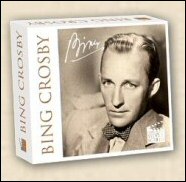
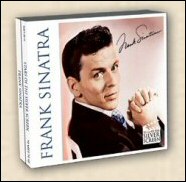
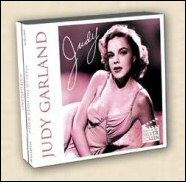
CD Box Sets
|